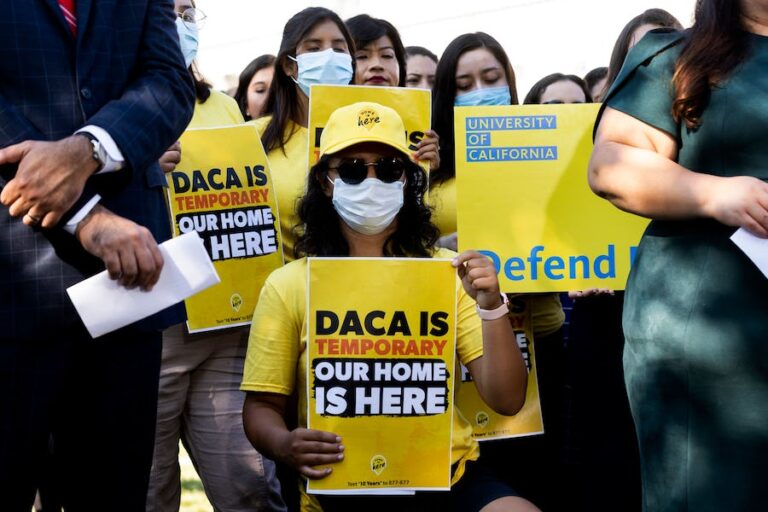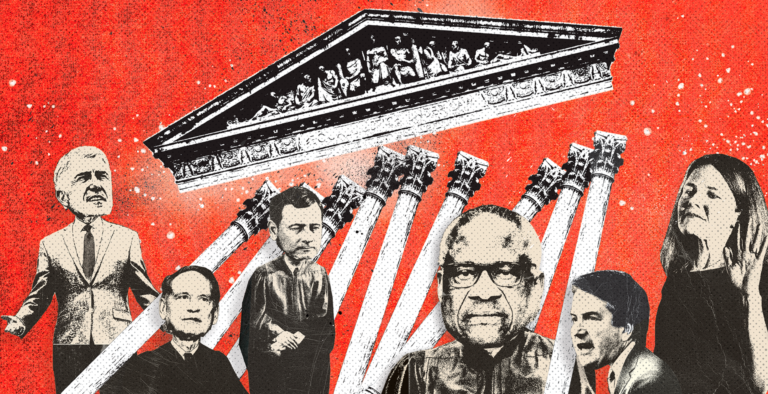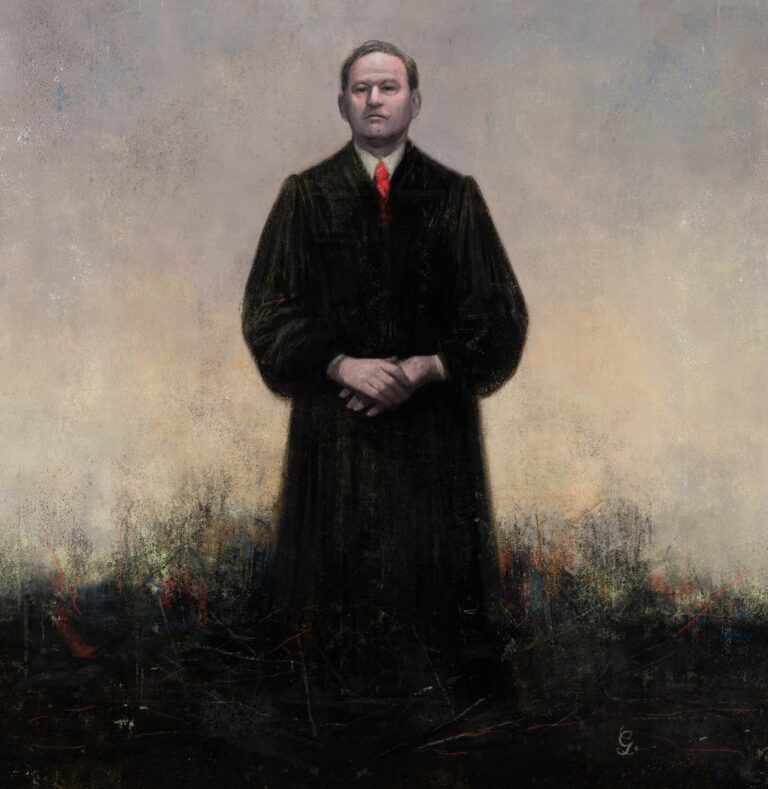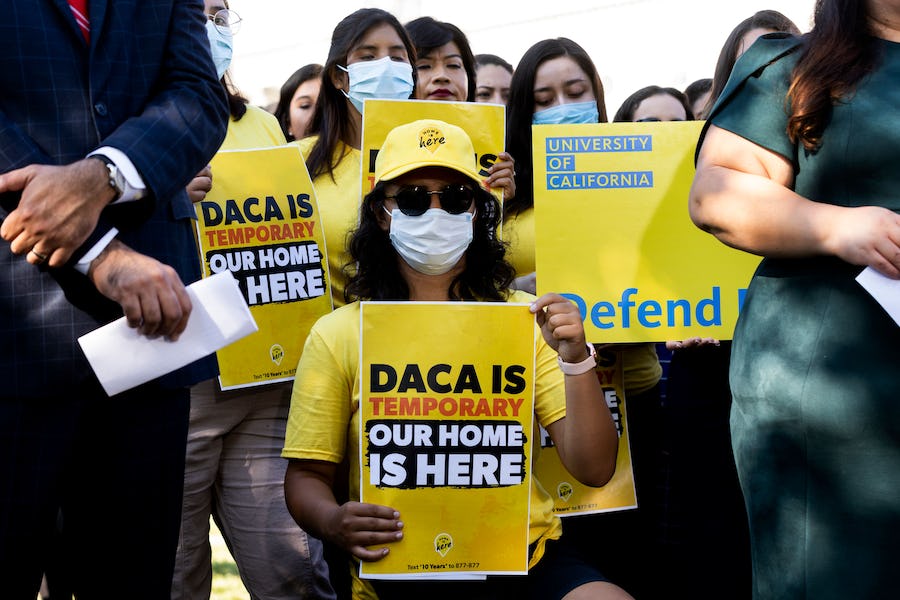The conservative legal movement is trying to stop student loan forgiveness
Less of This

Last week, the Biden administration announced its plan for student loan relief. Although it’s far from perfect, it’s a step in the right direction, especially as calls for debt cancellation rise nationwide. But once again, Republicans are intent on ruining everything, with reporting emerging this week that they’re devising plans to sue the Biden administration to keep Americans in debt.
On Thursday, The Washington Post reported that Republican state attorney generals, including those from Arizona, Missouri, and Texas, are considering their options for lawsuits to target the Biden administration’s plan. Although nothing has been filed yet, the outlet reported that a person familiar with the matter said Republicans are considering filing a slew of cases nationwide.
Read the Story on Mic
The Trump-appointed judge working to undermine her profession
Speaking Of...

One of the most dispiriting aspects of the decision yesterday by Federal District Court Judge Aileen Cannon—which granted former President Donald Trump’s request to appoint a special master to review the evidence seized from Mar-a-Lago by the FBI—is that it undermines the work of all the other judges who have tried to adhere to their oath to “administer justice without respect to persons, and do equal right to the poor and to the rich, and … faithfully and impartially discharge and perform all the duties incumbent” on the office. Her ruling is untethered to the law and presents a skewed recitation of the facts. Her actions make the question “Who appointed the judge?” a sadly relevant one in evaluating a judicial opinion.
Federal courts, with the notable exception of the Supreme Court, have generally fared well in providing a strong check and balance on attempted executive-branch abuses by Donald Trump. His efforts to have the courts further his bid to overthrow the will of the people in the last election have been rejected by judges nominated to the bench by both parties. The rule of law was on full display; courts around the nation repeatedly revealed a forum where facts, legal precedent, and logical reasoning have pride of place.
Cannon’s opinion, by contrast, is so deeply flawed that it’s hard to know where to begin a critique.
Read the story on The Atlantic
SCOTUS is on a collision course with democracy
Say It Louder

On the eve of his retirement, the nation’s first Black justice and constitutional giant, Thurgood Marshall, took a moment to denounce the Supreme Court of the United States over its “radical” path of abandoning past decisions for no other reason than the court’s membership had changed. Owing to these shifts in personnel, Marshall charged, now “scores of established constitutional liberties” hung in the balance, the powerless were left defenseless, and the court’s own authority and legitimacy were diminished. “Power, not reason, is the new currency of this Court’s decisionmaking,” Marshall warned in 1991, in what turned out to be his final dissenting opinion.
The dissenting justices in Dobbs v. Jackson Women’s Health Organization, the watershed case that discarded nearly 50 years of American jurisprudence protecting a woman’s right to terminate a pregnancy, felt the need to quote from Marshall’s decades-old warning because power, indeed, is the only sensible explanation for the Supreme Court’s present course. The seismic end of Roe v. Wade and Planned Parenthood v. Casey, two pillars of a much larger structure of unenumerated constitutional rights the high court has erected over almost a century, was neither legally necessary nor a product of profound changes in American society. Instead, five justices tore these precedents off the law books, ushering in a new era of abortion criminalization and second-class citizenship for half the nation, simply because they could—and had the numbers to do so. “Neither law nor facts nor attitudes have provided any new reasons to reach a different result than Roe and Casey did,” wrote Justices Stephen Breyer, Sonia Sotomayor, and Elena Kagan in their anguished Dobbs dissent. “All that has changed is this Court.”
Read the story on Vanity Fair
Alito’s crusade against America is fueled by anger
Perspective

Some baby boomers were permanently shaped by their participation in the countercultural protests and the antiwar activism of the nineteen-sixties and seventies. Others were shaped by their aversion to those movements. Justice Samuel Alito belongs to the latter category. For many years, he lacked the power to do much about that profound distaste, and in any case he had a reputation for keeping his head down. When President George W. Bush nominated Alito to the Supreme Court, in 2005, many journalists portrayed him as a conservative but not an ideologue. The Times noted that legal scholars characterized his jurisprudence as “cautious” and “respectful of precedent.” Self-described liberals who’d known him—as an undergraduate at Princeton, as a law student at Yale, or in some later professional capacity—sketched portraits of a quiet, methodical, reasonable man.
On the Court, even as Alito’s opinions aligned consistently with the goals of the Republican Party—in particular, of social conservatives—admirers praised him as pragmatic and Burkean. According to a 2018 C-span/P.S.B. poll, he was the conservative Justice the fewest Americans could name, and for years he was overshadowed by his more flamboyant late colleague, Antonin Scalia; by Clarence Thomas, whose notorious confirmation hearings were followed by a rivetingly long silence on the bench; even by Neil Gorsuch, with his cussed libertarian streak. Richard Lazarus, a professor at Harvard Law School who has studied the Court, told me that in Alito’s first years as a Justice he was known primarily as Chief Justice John Roberts’s right-hand man—“someone the Chief could assign to write an opinion” that would not be too flashy or provocative, and that “would keep five votes together when he couldn’t trust Scalia to do it, because Scalia would swing for the fences and risk losing votes.”
Read the story on New Yorker
Celebrate in person: October 19
RSVP

Featuring a keynote fireside chat with host & producer Saul Gonzales and law professor Jody Armour, moderated by Walt Disney Co staff lawyer Princess Manasseh.
RSVP >









